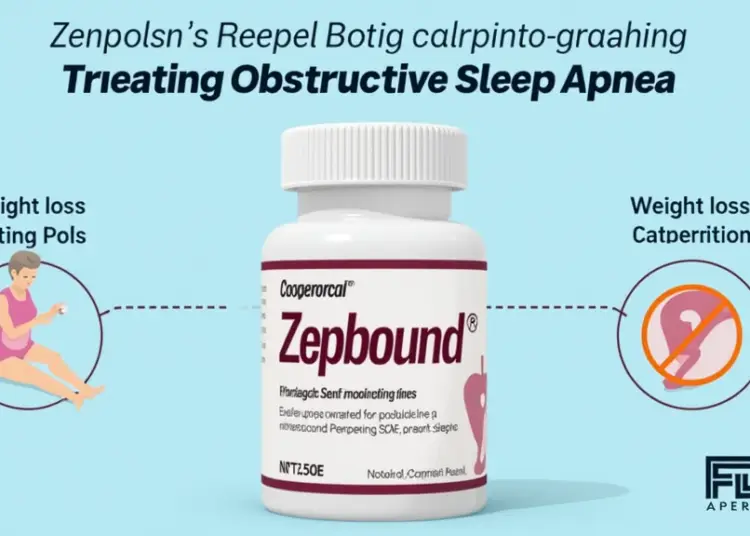Zepbound for obstructive sleep apnea represents a groundbreaking advancement in the treatment of moderate-to-severe OSA among adults struggling with obesity. Recently approved by the U.S. Food and Drug Administration (FDA), this innovative medication, also known as tirzepatide, not only targets the symptoms of sleep apnea but also promotes significant weight loss, addressing one of the key contributors to the condition. Eli Lilly and Company has developed Zepbound to enhance patient health outcomes, demonstrating promising results in clinical trials that indicate a reduction in breathing interruptions and improved overall sleep quality. With the rising awareness of sleep apnea treatment options, Zepbound stands out as a dual-action weight loss medication that could transform the lives of many. As patients explore the benefits and costs associated with Zepbound, it is essential to consider its potential impact on personal health and well-being.
The recent FDA endorsement of Zepbound for obstructive sleep apnea marks a significant step forward in managing this prevalent sleep disorder, especially for those dealing with obesity. This injectable treatment, tirzepatide, not only addresses the disruptive breathing patterns associated with OSA but also aids in weight reduction, enhancing overall health. Patients suffering from this condition often face numerous challenges, including excessive daytime sleepiness and increased risk of serious health complications. In this context, Zepbound emerges as a vital solution for effectively alleviating symptoms while contributing to a healthier lifestyle. As awareness of this sleep disorder grows, so does the importance of discussing innovative treatments like Zepbound with healthcare professionals.
Understanding Obstructive Sleep Apnea and Its Impacts
Obstructive sleep apnea (OSA) is a serious sleep disorder characterized by repeated interruptions in breathing during sleep. These interruptions can lead to significant health issues, including cardiovascular diseases, metabolic disorders, and cognitive impairments. Many individuals may dismiss OSA as merely a nuisance, often associating it with loud snoring. However, the reality is that OSA can severely affect overall health and quality of life. It’s crucial for those experiencing symptoms such as excessive daytime sleepiness, fatigue, and difficulty concentrating to seek medical advice.
The prevalence of OSA is notably higher among individuals with obesity, as excess weight can contribute to airway obstruction during sleep. This relationship highlights the importance of addressing both weight and sleep health in tandem. The recent FDA approval of Zepbound as a treatment option for OSA in patients with obesity represents a significant advancement in managing this disorder. By targeting the root causes of obesity, Zepbound not only alleviates OSA symptoms but also promotes healthier weight management.
The Role of Zepbound in Treating Obstructive Sleep Apnea
Zepbound, also known as tirzepatide, is a groundbreaking medication that has recently gained FDA approval for treating moderate-to-severe obstructive sleep apnea in adults with obesity. This innovative drug operates through a dual mechanism, utilizing glucose-dependent insulinotropic polypeptide (GIP) and glucagon-like peptide-1 (GLP-1) to suppress appetite and reduce caloric intake. As a result, patients can achieve significant weight loss, which is critical for improving OSA symptoms and overall health.
Clinical trials have shown that Zepbound not only reduces the frequency of breathing interruptions during sleep but can also lead to substantial weight loss—averaging around 45 pounds per participant. This is particularly advantageous, as weight loss can dramatically decrease the severity of OSA symptoms. By addressing both weight management and sleep apnea treatment simultaneously, Zepbound provides a comprehensive approach to improving health outcomes for those affected by these interconnected issues.
Exploring the Benefits of Tirzepatide for Patients
The benefits of tirzepatide extend beyond weight loss; it represents a multifaceted approach to treating obesity and its related complications, such as obstructive sleep apnea. Patients using tirzepatide can expect significant improvements in their overall health, including enhanced sleep quality, increased energy levels, and reduced risks associated with obesity-related conditions. As a novel weight loss medication, tirzepatide is designed to empower patients to take control of their health, making lifestyle changes more achievable.
Moreover, the dual-action mechanism of tirzepatide ensures that patients are not only losing weight but also experiencing improvements in metabolic health. The medication’s ability to regulate appetite and promote satiety makes it a valuable tool in the ongoing battle against obesity. As patients begin to lose weight, they may find their OSA symptoms diminish, leading to a more restful night’s sleep and improved daytime functioning.
Cost Considerations for Zepbound Treatment
When considering treatment options for obstructive sleep apnea, understanding the cost of Zepbound is essential. The medication is priced at approximately $1,086.37 per fill; however, actual costs will depend on individual insurance coverage and pharmacy pricing. For patients with commercial drug insurance, costs can be as low as $25 for a one- to three-month supply, making it a more accessible option for many.
It’s important to note that patients without insurance or with limited coverage may face higher out-of-pocket expenses. Eli Lilly, the manufacturer of Zepbound, is committed to patient accessibility and offers savings programs for eligible individuals. As the market evolves, patients are encouraged to consult their healthcare providers and insurance companies to explore potential coverage options and financial assistance.
Insurance Coverage for Zepbound: What You Need to Know
As Zepbound is a newly approved medication, the landscape of insurance coverage is still being determined. Patients should be aware that coverage for Zepbound may vary significantly based on individual insurance policies and formularies. While many insurers are likely to include Zepbound as a treatment option for obstructive sleep apnea, patients may need to advocate for their coverage.
It is advisable for patients to engage in discussions with their healthcare providers and insurance representatives to fully understand their coverage options. By doing so, patients can also inquire about eligibility for any savings programs that may help alleviate the financial burden of obtaining Zepbound as part of their treatment plan.
The Future of Sleep Apnea Treatments with Zepbound
The approval of Zepbound marks a significant milestone in the realm of sleep apnea treatments. As healthcare professionals continue to explore effective methods for managing obstructive sleep apnea, Zepbound offers a fresh perspective by addressing obesity as a critical factor. This innovative drug not only targets the symptoms of OSA but also aims to tackle the underlying causes, providing a holistic approach to treatment.
Patients and healthcare providers alike are hopeful that Zepbound will lead to a new era of sleep apnea management. With its unique ability to promote weight loss and improve metabolic health, Zepbound could potentially change the way OSA is treated, reducing the reliance on traditional therapies and enhancing patients’ overall quality of life.
Clinical Trials: The Efficacy of Zepbound in OSA Management
Eli Lilly’s clinical trials for Zepbound have yielded promising results, demonstrating its efficacy in managing obstructive sleep apnea. Participants in these trials experienced an impressive reduction in breathing interruptions, averaging 25 fewer occurrences per hour. This significant improvement highlights Zepbound’s potential as a game-changer in sleep apnea treatment.
In addition to reducing OSA symptoms, the trials revealed that up to 50% of participants no longer displayed signs of the condition after one year of treatment. Such outcomes underscore the importance of combining weight management strategies with sleep apnea interventions, creating a comprehensive treatment plan that addresses both issues effectively.
Patient Experiences: Success Stories with Zepbound
Many patients have shared their success stories regarding the use of Zepbound for treating obstructive sleep apnea. Reports indicate that individuals have experienced not only significant weight loss but also an improvement in their overall quality of life. Patients often express relief at being able to sleep through the night without interruptions and waking up feeling refreshed and energized.
These positive experiences serve as a testament to the effectiveness of Zepbound as a dual-purpose medication. By alleviating the symptoms of OSA while promoting weight loss, Zepbound empowers patients to reclaim their health and well-being, encouraging them to engage more actively in their daily lives and pursue healthier lifestyle choices.
Consulting Healthcare Providers About Zepbound
For individuals struggling with obstructive sleep apnea and obesity, consulting healthcare providers about Zepbound can be a pivotal step towards recovery. Healthcare professionals play a crucial role in assessing a patient’s suitability for Zepbound and discussing the potential benefits and risks involved. Open communication between patients and providers is essential for creating a tailored treatment plan that meets individual needs.
Patients are encouraged to share their symptoms, concerns, and treatment goals with their healthcare providers to ensure that Zepbound is integrated effectively into their overall care strategy. The collaborative approach not only enhances the likelihood of successful treatment outcomes but also fosters a supportive environment for patients as they navigate their health journeys.
Zepbound and Lifestyle Modifications for OSA Management
While Zepbound offers a promising treatment for obstructive sleep apnea, it is important for patients to consider lifestyle modifications as complementary strategies. Engaging in regular physical activity, adopting a balanced diet, and maintaining a healthy weight are critical factors that can enhance the effectiveness of Zepbound. These changes not only support weight loss efforts but also contribute to improved sleep quality.
Incorporating these lifestyle modifications alongside Zepbound treatment can create a synergistic effect, maximizing health benefits and reducing the severity of OSA symptoms. Patients should work closely with their healthcare providers to develop a comprehensive management plan that encompasses both medication and healthy lifestyle choices.
Frequently Asked Questions
What are the benefits of Zepbound for obstructive sleep apnea?
Zepbound (tirzepatide) offers significant benefits for individuals with obstructive sleep apnea (OSA) by not only reducing the symptoms associated with OSA, such as breathing interruptions and excessive daytime sleepiness, but also promoting substantial weight loss. Clinical trials showed that patients using Zepbound experienced an average reduction of 25 breathing interruptions per hour and some participants completely eliminated their OSA symptoms. Additionally, patients lost an average of 45 pounds, which can further alleviate OSA symptoms.
How does Zepbound work for treating obstructive sleep apnea?
Zepbound is a dual-action medication that targets obesity through mechanisms involving glucose-dependent insulinotropic polypeptide (GIP) and glucagon-like peptide-1 (GLP-1). It suppresses appetite and reduces caloric intake, which is particularly beneficial for individuals whose OSA symptoms are exacerbated by excess weight. Zepbound can be used alone or in combination with CPAP therapy, often leading to enhanced symptom relief and better health outcomes.
What is the cost of Zepbound for obstructive sleep apnea treatment?
The retail price of Zepbound is set at $1,086.37 per fill. However, costs may vary based on individual insurance coverage. Patients with commercial drug insurance could pay as little as $25 for a one- to three-month supply. Those without coverage may pay around $650 for a month’s supply. Eli Lilly is committed to accessibility, offering savings programs for eligible patients.
Will insurance cover Zepbound for obstructive sleep apnea?
Insurance coverage for Zepbound as a treatment for obstructive sleep apnea is anticipated, but specific details from insurers are still forthcoming. As a newly approved medication, it may take time for insurance companies to incorporate Zepbound into their formularies. Coverage will likely vary based on individual insurance policies, so patients are encouraged to consult their health care providers and insurers for information on coverage options.
What is the FDA approval status of Zepbound for obstructive sleep apnea?
Zepbound received FDA approval as the first prescription medication specifically for treating moderate-to-severe obstructive sleep apnea in adults with obesity. This approval opens up new treatment possibilities for those struggling with OSA and highlights the importance of addressing weight issues in managing this condition.
Can Zepbound be used alongside other sleep apnea treatments?
Yes, Zepbound can be used in conjunction with CPAP (Continuous Positive Airway Pressure) therapy or as a standalone treatment. Patients who use Zepbound alongside their CPAP experience enhanced benefits, including a higher likelihood of symptom remission related to obstructive sleep apnea.
What should I discuss with my doctor regarding Zepbound for obstructive sleep apnea?
When considering Zepbound for obstructive sleep apnea, it is essential to discuss its potential benefits, risks, and costs with your doctor. Understanding how Zepbound may integrate into your overall treatment plan, especially regarding weight management and symptom relief, will help you make informed decisions about your health.
| Key Point | Details |
|---|---|
| FDA Approval | Approved as the first prescription medication for moderate-to-severe obstructive sleep apnea (OSA) in adults with obesity. |
| Manufacturer | Eli Lilly and Company, focusing on innovative treatments for OSA. |
| Mechanism of Action | Dual-acting medication that integrates GIP and GLP-1 to suppress appetite and promote weight loss. |
| Clinical Trials Results | Participants experienced a reduction of 25 breathing interruptions per hour and significant weight loss (average 45 pounds). |
| Cost | Priced at $1,086.37 per fill, with potential insurance coverage reducing costs to as low as $25. |
| Insurance Coverage | Coverage details are still being finalized, and may vary by policy. |
| Overall Impact | Zepbound offers a new treatment option to improve health outcomes for those with OSA and obesity. |
Summary
Zepbound for obstructive sleep apnea represents a groundbreaking advancement in the treatment of this serious condition, particularly for adults struggling with obesity. With its unique dual-action mechanism, Zepbound not only addresses the symptoms of OSA but also promotes significant weight loss, which is crucial for managing this disorder. As the first FDA-approved medication for moderate-to-severe OSA in adults with obesity, Zepbound has shown promising results in clinical trials, leading to a substantial reduction in breathing interruptions and the potential for symptom remission. This innovative approach not only highlights the importance of proper treatment but also encourages discussions between patients and healthcare providers about effective management strategies for obstructive sleep apnea.












